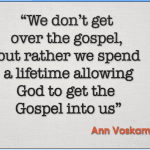Blogging is great for keeping us sharp and surely The SHEEP’S CRIB is determined to help all of us think clearly about preaching. Anyone who can read a raft of preaching posts by yours truly with as much attention to detail as he clearly has is worthy of a much better response than I am going to give tonight, but I get the feeling we may interact a lot about this in the coming weeks and months.
This whole subject has been very much an exploration for me- we dont talk enough about preaching and I dont claim to have all the answers by any means. I trust that a group of us may develop who discuss online some of the issues that are critical to this. The nature of blog posts is that they are usually incomplete and at times inbalanced and I am sure that my posts were at fault in many ways.
I would love though, since this is a discussion about preaching for Sheep’s crib to listen to my sermon on Romans 10 where I hope I do a better job of at least begining to explain myself. Also, the multitude of posts where I quote Spurgeon’s Soulwinner are also critical to this discussion.
I will try and respond to this helpful post and summarise my position here.
Firstly, crucially I of course believe that the Spirit is crucial to everything we do as Christians- he annoints the preacher and hearer alike and is vital for transformation. We need more of him- I am a charismatic after all! Spurgeon puts it wonderfully-
..Does any man know what the Spirit of God can make of him? I believe the greatest, ablest, most faithful, most holy man of God might have been greater, and abler, and more faithful, and more holy, if he had put himself more completely at the Spirit’s disposal. Wherever God has done great things by a man he has had power to do more had the man been fit for it. We are straitened in ourselves, not in God. O brothers, the church is weak to-day because the Holy Spirit is not upon her members as we could desire him to be. You and I are tottering along like feeble babes, whereas, had we more of the Spirit, we might walk without fainting, run without weariness, and even mount up with wings as eagles. Oh, for more of the anointing of the Holy Ghost whom Christ is prepared to give immeasurably unto us if we will but receive him!
That said, there are certain things that both preacher and hearer can do to put themselves in the right place for the Spirit to move. I am interested in learning more about the process of lives being transformed which I argue in my sermon Romans 10 shows in reverse- ie the prime agent in both salvation and sanctification is the SENDING by God of preachers who then preach, the people hear and then faith, or rather TRUST occurs in the hearers by the means of the Spirit taking those words and making them live.
Maybe I am over simplifying things, but I still dont see this vast distinction between the first breath of faith that marks the visible evidence of salvation and the faith we excercise ongoingly. Thus, I do deliberately mix up verses that talk to believers sanctification and their salvation- because in my view our sanctification is as much a result of our faith in Christ and his sacrifice for us as our salvation. I would love to see the distinction between the faith of salvation and ongoing faith argued from the bible more fully as so far I really havent seen the distinction. The more I study the more convinced I am of two things- firstly that the gospel of the bible is more complete than many evangelicals believe and secondly that snippets of it may be enough for saving faith to occur. Thus when I preach increasingly I am trying to talk to both believers and unbelievers in the same message- the Romans 10 one is an example of just that.
For both believers and unbelievers I would contend that the primary means of producing faith is the preached word heard appropriately by the hearer AND at the same time granted life by the Spririt who is the source of the faith in the hearer, the unction on the preacher, and the words of scripture that the preacher is expounding. Thus I do not see this dichotomy between different types of faith- for me ALL faith is both as a result of hearing the word of God proclaimed and/or demonstrated in some way (not necessarily a sunday morning) AND the work of the Holy Spirit. This is why I often ask my hearers to pray that the Holy Spirit will help both them and me before I begin to preach.
But what about the nuts and bolts of what preaching does to our brains themselves? I would like to point out that when I spoke of preaching changing associations this was because I do believe with many that a form of preaching that simply attempts to impart knowledge rather than values does not hit the mark. I know that there is a beneficial “drip drip” effect of repeated good preaching that is additional to anyone being able to recall specific points that the preacher has made. Of course, preaching is useless unless it is heard correctly and responded to by the hearer- the really crucial thing is a transformed life, but ultimately how we live is determined by what we believe and value emotionally. The way to a changed behaviour set is through a changed cognitive set. So again, I say that since we are renewed by the transformation of our minds, it is probably OK to use a shorthand and speak about the renewing of our minds, or indeed to say that if true change occurs in our hearts and minds then the full-body sacrifice of worship which Paul speaks of is an inevitable outcome. There is much, much more to be said on this.
I hope this discussion runs and runs. I would love to see more explanation of a number of points that Sheeps Crib makes- including his promise which I dont believe he keeps to explain how he sees proclamation and preaching as distinct. Also, I wonder if he will allow me to state that for a preacher at least when he is preaching it is precisely by changing peoples minds that he glorifys God. In other words, if by God’s grace my preaching magnifies the image of God in my hearers minds so that they too praise God, then I have glorified God in them. By getting agreement from his hearers with the basic premise that although God is holy and to be feared, he is also a God of love who cares for us and sent his son so we could live, a preacher causes glory and praise to be ascribed to God and fulfills the chief end of man as rightly understood by the catechisms- to glorify God and (or BY?) enjoying God forever.
There is probably more I need to pick up on from Sheep Crib’s very detailed post, but for now I think I have highlighted the most important points from my perspective.
















